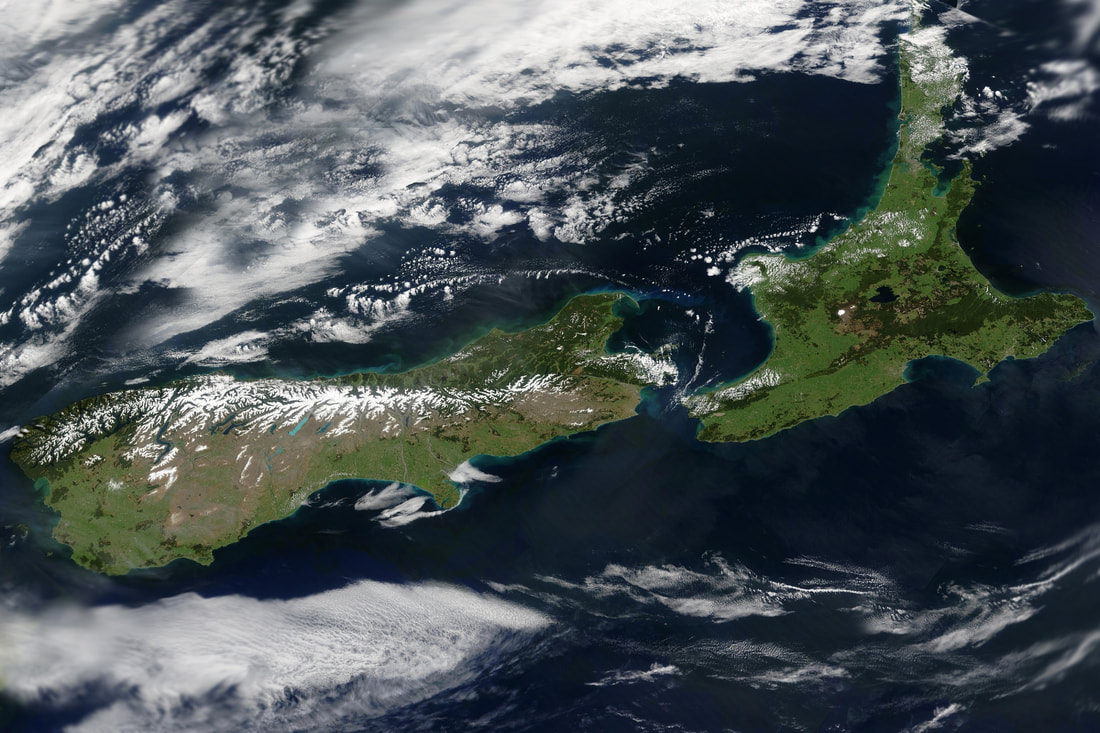|
Source: NASA John Key got it wrong. Had he campaigned to change the name of the country instead of the flag, he may have had a better Cause and chance at succeeding. After all, change the name of the country and a new flag is a certainty.
Let's cut to the chase, in my view the name of this country will be changed within 30 years and none too sooner. New Zealand for a name of this beautiful land of ours is a crime on all kiwis. The name is meaningless. If rewarding first explorers and discoverers by naming landmarks they found in their honour then Kupe, who is credited with the first sighting of these lands and named it Aotearoa has been overlooked to put it mildly. It was Kupe and the occupants of the seven Waka who first discovered these shores. There is more, the Maori descendents of the same first discoverers were living here when European ships first arrived. They lived and died, explored the land and settled the whenua. Children were born, battles were fought, victories were made and history created - for several hundred years. And they gave names to land, mountains, rivers and shores for several hundred years before Abel Tasman and James Cook arrived. In that regard, all the foreign names ascribed to landmarks in the colonial discovery era of two-hundred years between 1600 and 1800 for these regions are also redundant. The late arrivals - Tasman, Cook and others came to lands that were already discovered. Given our rich past, the name New Zealand has no connection at all with the land, the people and its long history. It is neither Maori nor British, the two peoples whose combined history has made this country what it is today. The name New Zealand sounds distinctly un-kiwi in its entirety. Say it out loud and hear it for the first time in the context of this discussion, and watch yourself cringe at the Zee sound. It is one of only two current words that I know of in the Kiwi vernacular with the letter “Z”. The other is buzzy-bee, a children’s toy. The folks who named our country did so from 16,000 miles away not having set foot on these shores or seen the makeup of the land. They were cartographers who took charge of maps and drawings supplied by Abel Tasman at the end of his journey of 1642. Then, Tasman was the first European to set foot on Kiwi soil; he named these isles Staten Landt on the premise that it was connected to the southern tip of South America. When Tasman returned to the Netherlands, mapmakers realised his error – Staten Landt was already taken and the new European discovery was a long way from Cape Horn. And thinking the two islands – north and south – looked like their own North Sea land, the cartographers who were charged with Tasman’s maps saw that the new discovery was nowhere near the South American contintent promptly renamed it after a province in Zeeland. This is a bigger crime, the country we inhabit was named by map makers who had not set foot on terra. One-hundred years later when Dutch seafaring was on the wane and British exploration on the rise, James Cook arrived here in 1770 on the first of his three sailings. Cook Anglicised the name to New Zealand – but still a Dutch name. The Dutch, being first in these parts also named the east coast of what is now Australia, New Holland. At least the Aussies had the decency to change the name of that continent to Australia, meaning the great southern landmass it was. Of recent times there have been a shedding of colonial names in favour of connection of meaning. Other name changes from colonial days include Vanuatu for New Hebrides, Samoa for Western Samoa, Kiribati for Gilbert Islands and Hawaii for Sandwich Isles. All the while we continue to retain a foreign name that has no connection or relevance to the land and the people. If the Dutch had settled these isles themselves, then maybe Nova Zeelandia might be appropriate for a name. But they did not, and so have no connection to the heatbeat of the place. The crime is, and still is – there are very good and appropriate Kiwi names for the land, names that were born of time and place. Names that have a connection, a spiritual meaning and historical relevance to the events that took place here. Increasingly in protest, I refer to New Zealand as Kiwiland. It is Maori and British. We seem to lack for originality when it comes to naming landmarks. We have North Island and South Island, the most significant landmarks that define us yet without world recognised names. Every other single island around the country has a name but the two obvious landmasses that define us - these places with deep historical connection to the people and the many events that took place since the first arrivals. There are other examples of meaningless names for significant kiwi landmarks – Auckland City for example was named after George Eden first Lord of Auckland who, as far as I know did not set foot anywhere near the Pacific let alone on these shores. Yet Eden gets a mountain named after him and the city. Naming landmarks in this fashion is a crime. When Cook sailed down the east coast of the country in early 1770 and saw a big mountain in the Taranaki region he pointed to it and named it Egmont after the 2nd Earl of Egmont, John Perceval. The tangata whenua who lived and toiled here had already named the same mountain Taranaki. In academia, first discoveries get naming rights. Failure to do so amounts to fraudulent activity. The same can be said for the name of this country. We have of course a worthy name for the country – Aotearoa. It was borne of time and place by actual settlers of the land. The same can be said for the city that is Tamaki Makaurau (Tamaki of a thousand lovers referring to the many volcanic cones that define the city). The shedding of colonial names by countries around us was in order to return identity of place to the people who actually lived in those lands. Samoa, meaning Sacred Centre (of the universe) is simply Samoa. Removing the colonial title of West returns Samoa to what it is – a country named by Samoans. Similarly Vanuatu - meaning a Land (vanua) of Truth (derives from Standing firm as in tu). The timeless home of the Vanuatu people is simply that, Land of firm belief and standing. We are increasingly searching for authenticity. Going back to origins and meaning. We continue to ask, where did we come from and what is our identity. Our identity is Kiwi, Maori and Pakeha. All the more reason to rename our place appropriately by ditching the Zealand. It has no connection to the history, culture, wairua or spirit of these lands. END Subscribe Here
0 Comments
Leave a Reply. |
Archives
May 2024
Samoa Swims & Events news
Categories |

